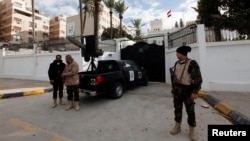TRIPOLI —
Four Egyptian embassy staff were kidnapped in Libya's capital Tripoli on Saturday, a day after another Egyptian diplomat was seized there by gunmen, the Libyan government said, underlining persistent disorder two years after Muammar Gaddafi's fall.
No group claimed responsibility for any of the abductions, but they came soon after one militia group reported that its leader had been arrested in Egypt and had warned of a response.
“Four more have been kidnapped. One of them is the cultural attache and the other three are staff,” the Libyan Foreign Ministry spokesman said, without going into further details.
The Egyptian government on Saturday confirmed the four had been abducted and said it was working with Libyan authorities to secure their release.
Two years after Gaddafi's overthrow, Libya remains in flux with the government struggling to rein in heavily-armed former rebels, militias and Islamist militants who fought in the uprising but often challenge central authority.
One militia group, the Operations Room of Libya's Revolutionaries, said on Friday its leader Shaban Hadia had been arrested in Egypt, where he had been traveling with his family for medical treatment.
The group's commanders denied involvement in the kidnappings because they operate nominally under the command of Libya's military chief of staff. On Friday they initially warned Egypt of a “strong response” if Hadia was not freed.
“What we have been warning the Egyptian authorities about since yesterday is that this kind of response was to be expected because of the security situation in the country,” commander Adel al-Gharyani said.
The Operations Room, a group of Islamist-leaning former rebel fighters hired by the government after Gaddafi's fall to provide security in Tripoli, was accused of briefly abducting Prime Minister Ali Zeidan last year.
Zeidan, a liberal, upset Libyan Islamists last year when he visited Egyptian chief of staff General Abdel Fattah al-Sisi after the military deposed the country's Islamist president, Mohamed Morsi, following protests against his rule.
A number of foreigners have been abducted and attacked in Libya in recent weeks. Security forces in Tripoli earlier this week freed a South Korean trade official held for days by kidnappers who officials said were not politically motivated.
An American teacher was shot dead in Benghazi in December, and in January, a British man and a New Zealand woman were killed on a beach in western Libya.
No group claimed responsibility for any of the abductions, but they came soon after one militia group reported that its leader had been arrested in Egypt and had warned of a response.
“Four more have been kidnapped. One of them is the cultural attache and the other three are staff,” the Libyan Foreign Ministry spokesman said, without going into further details.
The Egyptian government on Saturday confirmed the four had been abducted and said it was working with Libyan authorities to secure their release.
Two years after Gaddafi's overthrow, Libya remains in flux with the government struggling to rein in heavily-armed former rebels, militias and Islamist militants who fought in the uprising but often challenge central authority.
One militia group, the Operations Room of Libya's Revolutionaries, said on Friday its leader Shaban Hadia had been arrested in Egypt, where he had been traveling with his family for medical treatment.
The group's commanders denied involvement in the kidnappings because they operate nominally under the command of Libya's military chief of staff. On Friday they initially warned Egypt of a “strong response” if Hadia was not freed.
“What we have been warning the Egyptian authorities about since yesterday is that this kind of response was to be expected because of the security situation in the country,” commander Adel al-Gharyani said.
The Operations Room, a group of Islamist-leaning former rebel fighters hired by the government after Gaddafi's fall to provide security in Tripoli, was accused of briefly abducting Prime Minister Ali Zeidan last year.
Zeidan, a liberal, upset Libyan Islamists last year when he visited Egyptian chief of staff General Abdel Fattah al-Sisi after the military deposed the country's Islamist president, Mohamed Morsi, following protests against his rule.
A number of foreigners have been abducted and attacked in Libya in recent weeks. Security forces in Tripoli earlier this week freed a South Korean trade official held for days by kidnappers who officials said were not politically motivated.
An American teacher was shot dead in Benghazi in December, and in January, a British man and a New Zealand woman were killed on a beach in western Libya.











